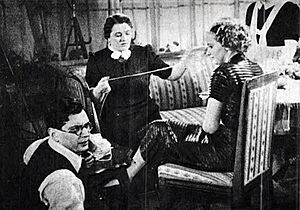Ladislao Vajda facts for kids
Quick facts for kids
Ladislao Vajda
|
|
|---|---|

Shooting photo from Az én lányom nem olyan. On the left the director László/Ladislao Vajda, in the middle Ella Gombaszögi, on the right Klári Tolnay.
|
|
| Born |
Weisz/Vajda László
18 August 1906 Budapest, Hungary
|
| Died | 25 March 1965 (aged 58) Barcelona, Spain
|
| Resting place | Sacramental de San Justo, Madrid, Spain |
| Occupation | Film director |
| Years active | 1932–1965 |
Ladislao Vajda was a famous film director from Hungary and Spain. He was born as Weisz László on August 18, 1906, in Budapest, Hungary. He passed away on March 25, 1965, in Barcelona, Spain.
Vajda directed many movies in different countries. These included Spain, Portugal, the United Kingdom, Italy, and West Germany. He is known for making films that were popular with both critics and audiences.
Contents
Biography
Early Life and Career Start
Ladislao Vajda was born in Budapest. His father was an actor and also wrote movie scripts. This meant Ladislao grew up around the film world.
He started his career working behind the scenes. He was a film editor, which means he put together all the different shots of a movie. He also worked as an artistic designer and a writer. He even worked with famous directors like Billy Wilder and Henry Koster.
First Steps as a Director
Eventually, Ladislao Vajda decided to direct his own movies. He made his first films in his home country, Hungary.
Before World War II, he moved to Italy. There, he directed two movies: La zia smemorata (1940) and Giuliano de' Medici (1941).
Moving to Spain and International Work
After Italy, he moved to Spain. He continued to direct films there. His first Spanish film was Se vende un palacio (A Palace for Sale), released in 1943.
During the 1940s, Vajda directed several movies. He worked in Portugal, the United Kingdom, and mostly in Spain.
His Most Famous Films
The 1950s were the best time for Vajda's films. His movies from this period were very successful. They were influenced by the German director Fritz Lang.
Some of his most important films from this time include:
- Miracle of Marcelino (1955)
- Uncle Hyacynth (1956)
- Afternoon of the Bulls (1956)
- The Man Who Wagged His Tail (1957), which starred Peter Ustinov
- It Happened in Broad Daylight (1958)
These films were loved by both critics and the public. The Miracle of Marcelino and Uncle Hyacynth won awards at big film festivals. These included the Cannes Film Festival and the Berlin Film Festival. Afternoon of the Bulls was nominated for the Palme d'Or. It Happened in Broad Daylight was nominated for the Golden Bear. These are all very important awards in the film world.
Later Years
In the 1960s, Vajda directed several smaller films. He worked in West Germany and Spain. He passed away in Barcelona in 1965.
Filmography
- The Beggar Student (1931)
- The Woman They Talk About (1931)
- My Heart Longs for Love (1931)
- Once There Was a Waltz (1932)
- A Bit of Love (1932)
- Where Is This Lady? (1932)
- Love on Skis (1933)
- Ball at the Savoy (1935)
- Haut comme trois pommes (1935)
- Szenzáció (1936)
- Ember a híd alatt (1936)
- Három sárkány (1936)
- Cafe Moscow (1936)
- Wings Over Africa (1937)
- The Wife of General Ling (1937)
- A kölcsönkért kastély (1937)
- Az én lányom nem olyan (1937)
- Princess Tarakanova (1938)
- Magda Expelled (1938)
- Döntő pillanat (1938)
- Black Diamonds (1938)
- Rézi Friday (1938)
- La zia smemorata (1940)
- Giuliano de' Medici (1941)
- A Palace for Sale (1942)
- Doce lunas de miel (1944)
- Te quiero para mí (1944)
- El Testamento del virrey (1944)
- O Diabo São Elas (1945)
- Cinco lobitos (1945)
- Tres espejos (1947)
- Viela, Rua Sem Sol (1947)
- Barrio (1947)
- Call of the Blood (1948)
- The Golden Madonna (1949)
- Sin uniforme (1950)
- The Woman with No Name (1950)
- The Seventh Page (1951)
- Spanish Serenade (1952)
- Doña Francisquita (1953)
- Carne de horca (1953)
- Aventuras del barbero de Sevilla (1954)
- Marcelino pan y vino (1955)
- Tarde de toros (1956)
- Mi tío Jacinto (1956)
- Un ángel pasó por Brooklyn (1957)
- It Happened in Broad Daylight (1958)
- The Man Who Walked Through the Wall (1959)
- Maria, Registered in Bilbao (1960)
- The Shadows Grow Longer (1961)
- The Liar (1961)
- The Lightship (1963)
- A Nearly Decent Girl (1963)
- La Dama de Beirut (1965)
See also

- In Spanish: Ladislao Vajda para niños
 | Victor J. Glover |
 | Yvonne Cagle |
 | Jeanette Epps |
 | Bernard A. Harris Jr. |

